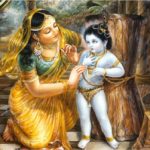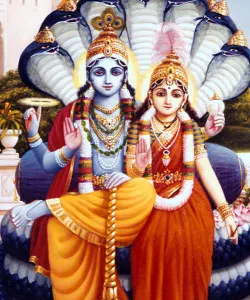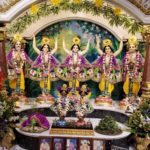Śrīla Prabhupāda’s Kīrtana Standards,” installment 38 In accordance with śāstra and Vaiṣṇava tradition, Śrīla Prabhupāda had us chant the Dāmodaraṣṭaka every day during the month of Karttika. Some decades after Śrīla Prabhupāda’s disappearance, the chanting of the Gopī-gītā—the songs sung by the gopīs—was somehow introduced at ISKCON Vrindāvan as an additional daily Karttika function. During Śrīla Prabhupāda’s presence, this was never done. These most sacred and intimate songs are of course entirely authorized, but the Bhāgavatam offers so many prayers we could chant—prayers … [Read more...] about Gopī-gītā for Karttika
All articles by Jayadvaita Swami
All the articles by Jayadvaita Swami on jswami.info
Ākharas (Added lines of elaboration)
What we chant in ISKCON’s daily program (continued) Śrīla Prabhupāda’s Kīrtana Standards,” installment 37 In my seminar on kīrtana standards, devotees have sometimes asked about ākharas. Bhakti Vikāsa Swami explains: Ākharas are lines added to songs for poetical effect. They are commonly used in Bengali kirtana to repeat or explain a point already made. They sometimes take the form of long poetical digressions. There are many standard ākharas for well-known Bengali songs. In ISKCON, only two simple ākharas are common: the lines gaurangera arotika sobha jaga jana mana lobha … [Read more...] about Ākharas (Added lines of elaboration)
Prema-dhvani
What we chant in ISKCON’s daily program (continued) Śrīla Prabhupāda’s Kīrtana Standards,” installment 36 The Prema-Dhvani (“Sounds of love”) are glorifications typically called out (in Hindi, by the way) at the end of a kīrtana. Śrīla Bhaktivinoda Ṭhākura includes one version of the Prema-dhvani in his Gītāvalī.1 And here is the way Śrīla Prabhupāda nearly always recited the Prema-dhvani:2 jaya oṁ viṣṇu-pāda paramahaṁsa parivrājakācārya aṣṭottara-śata śrī śrīmad bhaktisiddhānta sarasvatī gosvāmī prabhupāda kī jaya ananta-koṭi vaiṣṇava-vṛnda kī jaya nāmācārya śrīla … [Read more...] about Prema-dhvani
My personal finances, 2022
Every year I make my personal finances public. Attached is an accounting of my finances for 2022. … [Read more...] about My personal finances, 2022
Tulasī Worship
What we chant in ISKCON’s daily program (continued) Śrīla Prabhupāda’s Kīrtana Standards,” installment 35 In the tulasī praṇāma, in the line vṛndāyai tulasī-devyai, the right word is devyai, not devī or devai. And the often-heard nivedena is a mispronunciation of nivedana, which denotes a request or appeal. Similarly, adhikoro is an attempted Bengali pronunciation that gets things only half right. What we want is adhikāro. And should we say kṛṣṇa-bhakti or viṣṇu-bhakti? The way Śrīla Prabhupāda gave us the mantra (in a letter to Govinda Dāsī dated April 7, 1970), it’s … [Read more...] about Tulasī Worship
The “Deity mantras”
What we chant in ISKCON’s daily program (continued) “Śrīla Prabhupāda’s Kīrtana Standards,” installment 29 In 1976 Śrutadeva Dāsa, when Temple President in London, wrote to Śrīla Prabhupāda asking if it was acceptable to chant in kīrtana “Jaya Rādhā London-īśvara. . . Prabhupādera prāṇa-dhana he” (adapted from the song Rādhā Kṛṣṇa Gīti).1 Śrīla Prabhupāda replied, “Yes you have my permission to sing as you have requested.”2 New Vrindaban, I’ve somewhere heard, received similar approval. But what Śrīla Prabhupāda permitted has now become de rigueur. You’ve got to do it, or … [Read more...] about The “Deity mantras”
What we chant in ISKCON’s daily program
“Śrīla Prabhupāda’s Kīrtana Standards,” installment 28 Here let’s look at some specific features of what we chant every day. (We’ll have more in coming installments.) More about the morning tune As mentioned before, there is a particular tune Śrīla Prabhupāda wanted us to chant for the maṅgala-ārātrika. One can hear Śrīla Prabhupāda sing this tune on the recording here, where he says, “This is the morning tune.” The tune appears in Western musical notation in The Hare Krishna Music Book by Joan Wilder, published by the BBT, and in Bhakti Gauravani Goswami’s Sacred Song … [Read more...] about What we chant in ISKCON’s daily program
Jaya Pañca-tattva, Jaya Pañca-tattva
“Śrīla Prabhupāda’s Kīrtana Standards,” installment 23 As mentioned above (under “The real point: Strictly follow”), Śrīla Prabhupāda instructed that we should chant “only what the ācāryas have given,” that “the ācāryas only chant all five names of the Pañca-tattva,” and that we should not “chant our own made-up mantras.” And yet we hear: Jaya Pañca-tattva! Jaya Pañca-tattva!Jaya Pañca-tattva! Jaya Pañca-tattva! This is not something the ācāryas have given. It doesn’t include any of the five names. It wasn’t chanted by Śrīla Prabhupāda. And we don’t hear it even in the … [Read more...] about Jaya Pañca-tattva, Jaya Pañca-tattva
Jaya Gurudeva!
“Śrīla Prabhupāda’s Kīrtana Standards,” installment 22 The chanting of “Jaya Gurudeva” has become popular in ISKCON, but like other chants not received directly from Śrīla Prabhupāda, this one has its problems. Kripamoya Prabhu gives the following account: February 1977, Gaura Pūrṇimā. Before the first maṅgala-ārati, Pañca-dravida Swami had been chanting bhaja bhakata vatsala śrī gaura-hari for the maṅgala offering, before the ārati. During the maṅgala-ārati kīrtana someone had been chanting —for Prabhupāda, of course—Jaya Gurudeva. And Bhavānanda came down after … [Read more...] about Jaya Gurudeva!
The Pañca-tattva mantra
“Śrīla Prabhupāda’s Kīrtana Standards,” installment 21 Chant the Pañca-tattva mantra first In a Caitanya-caritāmṛta purport, Śrīla Prabhupāda instructed: At the beginning of every function in preaching, especially before chanting the Hare Kṛṣṇa mahā-mantra—Hare Kṛṣṇa, Hare Kṛṣṇa, Kṛṣṇa Kṛṣṇa, Hare Hare / Hare Rāma, Hare Rāma, Rāma Rāma, Hare Hare—we must chant the Pañca-tattva’s names and offer our respects to them.1 In the previous chapter he had written: As preachers of the Kṛṣṇa consciousness movement, we first offer our obeisances to Śrī Caitanya Mahāprabhu by … [Read more...] about The Pañca-tattva mantra











You must be logged in to post a comment.